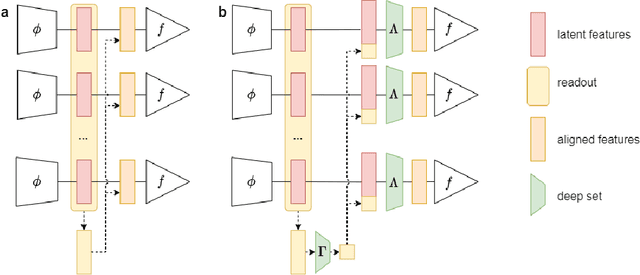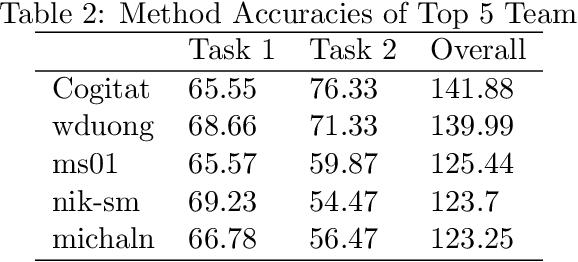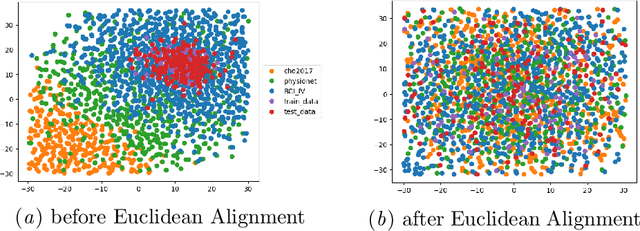Konstantinos Barmpas
EEG-D3: A Solution to the Hidden Overfitting Problem of Deep Learning Models
Dec 15, 2025Abstract:Deep learning for decoding EEG signals has gained traction, with many claims to state-of-the-art accuracy. However, despite the convincing benchmark performance, successful translation to real applications is limited. The frequent disconnect between performance on controlled BCI benchmarks and its lack of generalisation to practical settings indicates hidden overfitting problems. We introduce Disentangled Decoding Decomposition (D3), a weakly supervised method for training deep learning models across EEG datasets. By predicting the place in the respective trial sequence from which the input window was sampled, EEG-D3 separates latent components of brain activity, akin to non-linear ICA. We utilise a novel model architecture with fully independent sub-networks for strict interpretability. We outline a feature interpretation paradigm to contrast the component activation profiles on different datasets and inspect the associated temporal and spatial filters. The proposed method reliably separates latent components of brain activity on motor imagery data. Training downstream classifiers on an appropriate subset of these components prevents hidden overfitting caused by task-correlated artefacts, which severely affects end-to-end classifiers. We further exploit the linearly separable latent space for effective few-shot learning on sleep stage classification. The ability to distinguish genuine components of brain activity from spurious features results in models that avoid the hidden overfitting problem and generalise well to real-world applications, while requiring only minimal labelled data. With interest to the neuroscience community, the proposed method gives researchers a tool to separate individual brain processes and potentially even uncover heretofore unknown dynamics.
Are Large Brainwave Foundation Models Capable Yet? Insights from Fine-tuning
Jul 01, 2025Abstract:Foundation Models have demonstrated significant success across various domains in Artificial Intelligence (AI), yet their capabilities for brainwave modeling remain unclear. In this paper, we comprehensively evaluate current Large Brainwave Foundation Models (LBMs) through systematic fine-tuning experiments across multiple Brain-Computer Interface (BCI) benchmark tasks, including memory tasks and sleep stage classification. Our extensive analysis shows that state-of-the-art LBMs achieve only marginal improvements (0.9%-1.2%) over traditional deep architectures while requiring significantly more parameters (millions vs thousands), raising important questions about their efficiency and applicability in BCI contexts. Moreover, through detailed ablation studies and Low-Rank Adaptation (LoRA), we significantly reduce trainable parameters without performance degradation, while demonstrating that architectural and training inefficiencies limit LBMs' current capabilities. Our experiments span both full model fine-tuning and parameter-efficient adaptation techniques, providing insights into optimal training strategies for BCI applications. We pioneer the application of LoRA to LBMs, revealing that performance benefits generally emerge when adapting multiple neural network components simultaneously. These findings highlight the critical need for domain-specific development strategies to advance LBMs, suggesting that current architectures may require redesign to fully leverage the potential of foundation models in brainwave analysis.
Advancing Brainwave Modeling with a Codebook-Based Foundation Model
May 22, 2025Abstract:Recent advances in large-scale pre-trained Electroencephalogram (EEG) models have shown great promise, driving progress in Brain-Computer Interfaces (BCIs) and healthcare applications. However, despite their success, many existing pre-trained models have struggled to fully capture the rich information content of neural oscillations, a limitation that fundamentally constrains their performance and generalizability across diverse BCI tasks. This limitation is frequently rooted in suboptimal architectural design choices which constrain their representational capacity. In this work, we introduce LaBraM++, an enhanced Large Brainwave Foundation Model (LBM) that incorporates principled improvements grounded in robust signal processing foundations. LaBraM++ demonstrates substantial gains across a variety of tasks, consistently outperforming its originally-based architecture and achieving competitive results when compared to other open-source LBMs. Its superior performance and training efficiency highlight its potential as a strong foundation for future advancements in LBMs.
2021 BEETL Competition: Advancing Transfer Learning for Subject Independence & Heterogenous EEG Data Sets
Feb 14, 2022



Abstract:Transfer learning and meta-learning offer some of the most promising avenues to unlock the scalability of healthcare and consumer technologies driven by biosignal data. This is because current methods cannot generalise well across human subjects' data and handle learning from different heterogeneously collected data sets, thus limiting the scale of training data. On the other side, developments in transfer learning would benefit significantly from a real-world benchmark with immediate practical application. Therefore, we pick electroencephalography (EEG) as an exemplar for what makes biosignal machine learning hard. We design two transfer learning challenges around diagnostics and Brain-Computer-Interfacing (BCI), that have to be solved in the face of low signal-to-noise ratios, major variability among subjects, differences in the data recording sessions and techniques, and even between the specific BCI tasks recorded in the dataset. Task 1 is centred on the field of medical diagnostics, addressing automatic sleep stage annotation across subjects. Task 2 is centred on Brain-Computer Interfacing (BCI), addressing motor imagery decoding across both subjects and data sets. The BEETL competition with its over 30 competing teams and its 3 winning entries brought attention to the potential of deep transfer learning and combinations of set theory and conventional machine learning techniques to overcome the challenges. The results set a new state-of-the-art for the real-world BEETL benchmark.
Team Cogitat at NeurIPS 2021: Benchmarks for EEG Transfer Learning Competition
Feb 01, 2022Abstract:Building subject-independent deep learning models for EEG decoding faces the challenge of strong covariate-shift across different datasets, subjects and recording sessions. Our approach to address this difficulty is to explicitly align feature distributions at various layers of the deep learning model, using both simple statistical techniques as well as trainable methods with more representational capacity. This follows in a similar vein as covariance-based alignment methods, often used in a Riemannian manifold context. The methodology proposed herein won first place in the 2021 Benchmarks in EEG Transfer Learning (BEETL) competition, hosted at the NeurIPS conference. The first task of the competition consisted of sleep stage classification, which required the transfer of models trained on younger subjects to perform inference on multiple subjects of older age groups without personalized calibration data, requiring subject-independent models. The second task required to transfer models trained on the subjects of one or more source motor imagery datasets to perform inference on two target datasets, providing a small set of personalized calibration data for multiple test subjects.
 Add to Chrome
Add to Chrome Add to Firefox
Add to Firefox Add to Edge
Add to Edge